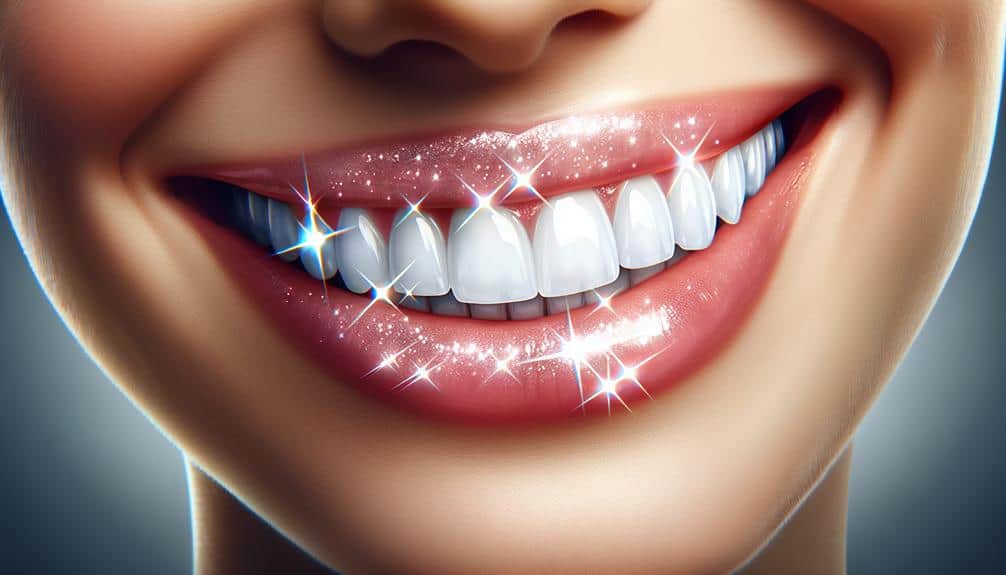To prevent and whiten discolored teeth naturally, consider avoiding coffee, tobacco, tea, red wine, and foods that can stick to enamel. Try using a paste of lemon juice and baking soda, coconut oil pulling, charcoal powder, turmeric paste, or diluted apple cider vinegar. Maintain good oral hygiene by brushing properly with fluoride toothpaste, daily flossing, using antimicrobial mouthwash, scheduling regular dental check-ups, and treating your enamel gently.
Oil pulling has benefits like teeth whitening, bacteria removal, fresher breath, cavity prevention, and a cost-effective approach to oral health enhancement. Incorporating these remedies and practices daily can brighten your smile without harsh chemicals or costly treatments.
Key Points
- Avoid dark-colored beverages like coffee and red wine.
- Use natural remedies like coconut oil pulling and turmeric paste.
- Limit consumption of foods that can adhere to enamel.
- Practice good oral hygiene with proper brushing and flossing.
- Consider oil pulling for whitening, bacteria removal, and fresher breath.
Causes of Teeth Discoloration
Teeth discoloration can be caused by various factors such as diet, lifestyle choices, and the natural aging process. While dental procedures like root canals or fillings can also contribute to discoloration, the primary culprits are often vital external factors. As you age, the enamel on your teeth thins, allowing the yellowish dentin beneath it to show through more prominently. This, coupled with a lifetime of consuming foods and drinks that stain, can lead to noticeable discoloration.
Certain lifestyle choices such as smoking or regularly consuming dark-colored beverages like coffee, tea, and red wine can accelerate the staining process. Dental procedures like amalgam fillings can also cause a grayish hue to develop over time. Understanding these factors is essential in developing strategies to prevent further discoloration and brighten your smile. By addressing these causes through lifestyle modifications and possibly dental interventions, you can work towards achieving a whiter, brighter smile.
Foods to Avoid for Whiter Teeth
To achieve whiter teeth, it's essential to be mindful of the foods you consume that can contribute to discoloration. Certain foods and drinks can stain your teeth over time, making them appear less white than desired. Here are some items to avoid for whiter teeth:
- Coffee Stains: Coffee is a common culprit for tooth discoloration due to its dark pigments that can adhere to the enamel.
- Tobacco Discoloration: Tobacco products, such as cigarettes, contain tar and nicotine that can yellow teeth and lead to unsightly stains.
Natural Whitening Remedies at Home
For a natural approach to brightening your smile at home, consider incorporating simple ingredients found in your kitchen pantry. Lemon juice is a popular natural teeth whitener due to its acidic properties that can help remove stains. Mix lemon juice with baking soda to create a paste that can gently scrub away discoloration.
Coconut oil pulling is another effective method where swishing coconut oil in your mouth can reduce bacteria and promote whiter teeth. Charcoal powder is known for its ability to absorb toxins and can be used sparingly to whiten teeth, but be cautious as excessive use may damage enamel.
Turmeric paste, despite its yellow color, can surprisingly whiten teeth due to its anti-inflammatory properties. Lastly, apple cider vinegar, although acidic, can be diluted with water and used as a mouthwash to help remove stains. Remember to use these remedies in moderation and consult with a dentist if you have any concerns about their effects on your oral health.
Best Practices for Oral Hygiene
Maintaining ideal oral hygiene practices is vital for promoting overall dental health and preventing potential issues. To guarantee your teeth stay healthy and white, follow these best practices:
- Proper brushing: Brush your teeth at least twice a day for two minutes each time using a fluoride toothpaste. Be gentle to avoid damaging your enamel.
- Flossing: Floss daily to remove plaque and food particles from between your teeth where your toothbrush can't reach.
- Mouthwash: Rinse with an antimicrobial mouthwash to help reduce plaque, prevent gum disease, and freshen your breath.
- Dentist visits: Regularly schedule dental check-ups and cleanings to detect and prevent any oral health problems early on.
Benefits of Oil Pulling
Maintain ideal oral health by exploring the advantages of oil pulling, a traditional oral hygiene practice known for its potential whitening and cleansing effects on teeth. Oil pulling, a form of oil therapy, involves swishing oil around the mouth to remove bacteria, plaque, and debris. This technique has been used for centuries in Ayurvedic medicine and is gaining popularity in modern dental care.
The benefits of oil pulling extend beyond oral health. Research suggests that this practice can reduce harmful bacteria in the mouth, leading to fresher breath and improved gum health. Additionally, oil pulling is believed to help prevent cavities and promote overall dental hygiene.
Regular oil pulling with coconut, sesame, or sunflower oil can contribute to a brighter smile by removing surface stains on teeth. It's a natural and cost-effective way to enhance oral health without harsh chemicals or abrasives. Consider incorporating oil pulling into your daily routine to experience its potential whitening and cleansing effects on your teeth.
Frequently Asked Questions
Can Stress and Anxiety Contribute to Teeth Discoloration?
When you're stressed or anxious, your mind-body connection can impact oral health. Emotional well-being affects dental care, potentially contributing to teeth discoloration. Maintaining balance and managing stress can help preserve the health of your teeth.
Are There Any Specific Beverages That Can Help Prevent Teeth Discoloration?
To prevent teeth discoloration, consider incorporating beverages like herbal teas and antioxidant-rich fruits. These can help combat staining and improve overall oral health. Spices such as turmeric can also contribute to maintaining a bright smile naturally.
How Often Should Natural Whitening Remedies Be Used at Home to See Noticeable Results?
To see best results with natural whitening remedies at home, use them regularly. The frequency of use plays a key role in achieving noticeable changes. Consistency is key in allowing these remedies to effectively whiten discolored teeth.
Is It Possible to Overdo Oral Hygiene Practices and Damage the Enamel of the Teeth?
You can indeed overdo oral hygiene practices and harm your enamel. Like a delicate balance, excessive brushing or harsh substances can weaken enamel. Stick to recommended limits and gentle care for strong, healthy teeth.
Can Oil Pulling Be Effective for Whitening Teeth in Addition to Its Other Oral Health Benefits?
Oil pulling benefits your oral health by reducing harmful bacteria. While it can freshen breath and improve gum health, evidence on its whitening results is limited. Its stress impact may indirectly aid in anxiety reduction.
Conclusion
To sum up, maintaining your oral health and preventing teeth discoloration can be accomplished through simple natural remedies and good oral hygiene practices.
By steering clear of certain foods, utilizing home remedies like baking soda and hydrogen peroxide, and including oil pulling into your routine, you can uphold a bright, white smile.
Remember, a healthy smile is like a ray of sunshine on a cloudy day, so take care of your teeth and keep shining bright.



